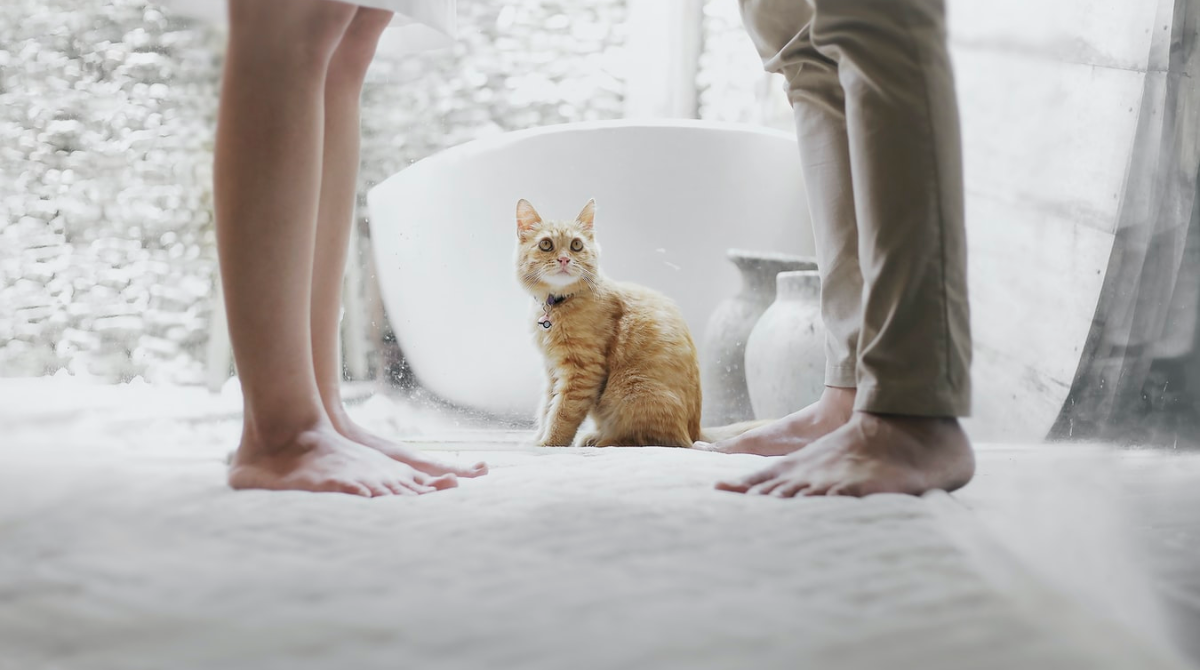Josh and his team proved their track record. I hired him at 9am and they appeared for me by 1pm the same day. Highly contested paternity case, turned dependency nightmare. He faught hard in a short time and got the results I needed. My baby back. Josh and his associates are kind, patient, diligent and aggressive. They are human. I trusted them through the whole process. I was kept informed and they faught with passion. I’d rehire josh and his team any day. It was well worth the money spent. – Rochelle

Pets and Divorce in Florida: Current Law and National Trends
Pets in Divorce: Current Law and National Trends
Some say law follows culture, but incrementally. The hot button issue of pet custody in divorces is a fine example of the reluctance of the courts and the legislatures to recognize the extraordinary and dynamic relationship between owners and their pets that exists in today’s world. Some folks even refuse to use the term “pet” and prefer the term “companion.”
Dogs are especially important to our culture and are routinely put in harms’ way to protect, improve, and save lives. Seeing-eye dogs, therapy dogs, police and military K9s, dogs that can sniff out cancer, predict strokes and heart attacks, and rescue and tracking dogs are some examples of the crucial role of animals today. Dogs have been used successfully in prison rehabilitation and in hospitals to comfort children and adult patients. Pets can help ward off loneliness and depression, as well as protect the household. These are just some of the amazing things animal companions provide for us. The growing respect for animals is clearly seen in the funeral processions of K9 officers slain in the line of duty.
Given their cultural significance, pets are often an important consideration when it comes to divorce. Pets in divorce are often points of contention, and the rules governing pet ownership, transfer, and other matters vary from state to state.
In this article, we’ll focus in on pets in divorce as they relate to the Florida courts, and provide you with the information you need if you’re considering divorce.
Florida’s Approach to Pets in Divorce
The sole Florida case to address this issue is, Bennett v. Bennett, 655 So. 2d 109 (Fla. 1st DCA 1995). The First District Court of Appeals clearly defined the family pet as personal property and rejected a trial court’s order that provided post-divorce visitation for the parties’ dog. The Florida court recognized that other states have provided pets in divorce with special status in divorce proceedings, but refused to adopt them, citing the substantial burdens to the court system required to enforce such an order. Therefore, the courts continue to apply traditional equitable distribution principles that treat pets in divorce as personal property. Despite the lower court’s effort to reach a fair solution, the appellate court declared that pets are not subject to a best interest analysis reserved for children.
Therefore, it is unlikely that the trial court would be able to take testimony concerning non-economic valuation testimony, such as possible harm or abuse to the animal.
Equitable Distribution Generally
Equitable distribution is the legal process of identifying, valuing, and distributing marital assets and liabilities acquired from the marriage which includes pets. Of course, the methods of distribution of property can vary widely from case to case. But the goal is an equal or fair scheme of distribution. The parties receive their respective property and return to the status of being single. The major difference between property distribution and child custody orders is the lack of post-decree remedies regarding property distribution. The courts do not retain post-divorce jurisdiction of equitable distribution orders because the goal of property distribution is finality. There is no statutory guidance regarding pets in divorce in the state of Florida.
National Trends
Courts in the US vary in their approach to this problem. They fall into three basic categories: The personal property approach, the personal property plus approach, and a best-interest analysis. And while the courts are changing their view of the role of pets in our society, there is the usual unevenness that comes with developing new laws, along with a healthy amount of pushback.
Personal Property
Notwithstanding the importance of pets to the health and wellbeing of millions of people today. the majority of jurisdictions continue to take the narrow approach of a “personal property” analysis regarding pets in divorce. Therefore, the trial court’s role is simply to assign a monetary value to the pet, just as any other piece of property, based on the fair market value of the pet. While a particular pet may have economic value, few pet owners view their pets as such. In fact, many owners would not part with their beloved pets for any amount of money.
The fair market value approach removes the complex analysis of factors such as love, devotion, and best interests in favor of a relatively simplistic approach to economic valuation. But the courts’ approach fails to capture the value human beings place upon the relationship and companionship of pets in today’s society. Pets are not the equivalent of any object one may own. Pets have become family members in the minds of many people today.
One of the impediments to a more enlightened approach to pets in divorce is the extraordinary burden that Probate Court Judges and courts shoulder concerning child custody.
Personal Property Plus
The Personal Property Plus doctrine is trending in some states. In Tennessee, the court upheld an award of ownership of the parties’ dogs where the trial court considered the dog’s needs and the parties’ ability to care for them. Michigan did the same in Aho v. Aho, 2012 WL 5235982, at *5 (Mich. Ct. App. 2012) awarding the dog to the plaintiff to keep the parties’ animals together. Both courts rejected a strict property analysis and recognized that dogs are intelligent and emotional creatures that differ from personal property. They noted that animals are protected by laws prohibiting animal cruelty. Therefore, the courts, they reasoned, must consider the pet’s interests when a marriage fails.
Alaska was the first state to pass legislation that permits the trial court to consider the well-being of animals in divorce proceedings.
The New York Supreme Court in Travis v. Murray, 42 Misc. 3d 447 (N.Y. Sup. Ct. 2013), ruled that parties can present evidence using a “best for all” standard when ruling on animal custody.
These trends show a glacial, but a positive movement towards the courts’ understanding of the importance of pets in people’s lives.
Best Interests
The best interest of the animal standard is the most radical. Connecticut, Alabama and Arkansas, and Maryland have used this approach or something similar (it was the right thing to do). These courts did not hesitate to acknowledge the love in the heart of a dog as well as a person. Other courts have permitted visitation and conservatorship.
However, there is some pushback. Oregon’s courts found the visitation question interesting but cited the impractical task of determining best interest and other problems associated with enforcing such order, including modifications. Many judges and child advocates react strongly against the suggestion that pets are entitled to the same type of protection as children. They are offended by the use of public and private resources to litigate “custody” of a family pet. The Queen’s Bench of Saskatchewan court dismissed pet custody litigation stating: “It is demeaning for the court and legal counsel to have these parties call upon these legal and court resources because they are unable to settle, what most would agree, is an issue unworthy of this expenditure of time, money, and public resources.”
What this means for you
The obvious conclusion in Florida is that the parties must find some way, either through negotiation ADR (mediation, arbitration, private judge) to resolve this difficult and emotional issue. The trial court is not permitted to take evidence or make rulings about anything other than value.
Making Law
We at Brodie & Friedman have the expertise and experience to assist you in resolving any pet custody dispute. We are able, if necessary, to appeal on your behalf, a trial court’s order regarding your pets, and endeavor to “make law” on your behalf.
If you’re contemplating an uncoupling, we at the law firm of Brodie Friedman are here to answer any questions you have regarding your family, the law, and the rights of children in divorce. We are an experienced team of professionals that can help you protect your children.
With over 30 years of combined experience, Jason Brodie Esq. and Joshua Friedman Esq. will guide you toward realistic goals and provide committed advocacy toward achieving them. They are known throughout South Florida for dedicated client service, tenacity, and success in complex divorce litigation involving property division, child custody, and spousal support.
To get a better understanding of the qualities our reputation is built on, contact our office in Boca Raton to schedule your initial phone consultation (561) 392-5100






 Mon – Fri, 9AM – 5PM
Mon – Fri, 9AM – 5PM
 1675 N. Military Trail, Suite 730 Boca Raton, Florida 33486
1675 N. Military Trail, Suite 730 Boca Raton, Florida 33486